Homework: Unnecessary stress or useful learning tool?
November 7, 2019
She’s at her desk, writing a report that’s due tomorrow. Her arm is resting on her table, at a ninety-degree angle on the table. The lights are off in her room, save for the white light issuing from her Ikea lamp. Her black lab nuzzles the fuzzy pink carpet behind her. The only sound is from her mechanical pencil that scratches out the last of a paragraph. She glances at her phone, wanting a break.
Indulging herself, she grabs her phone, resting her forearms on her desk. She checks her messages first, then connects her Bluetooth speaker. She presses play and gets up from her chair, needing some activity besides the monotonous report that was so time-consuming. The upbeat music that flows out of her speaker washes thoughts of her report away – and then Margareta wonders what her life would be like with less homework.
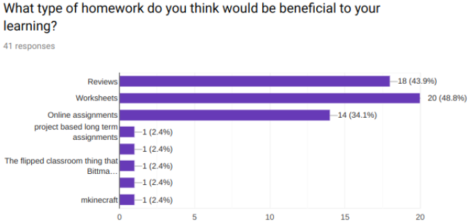
Most teachers, students and scientists feel like homework is best in small amounts, about 15-30 minutes of review of what was covered in the lesson.
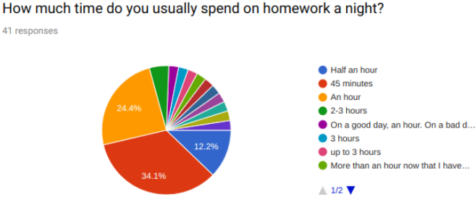
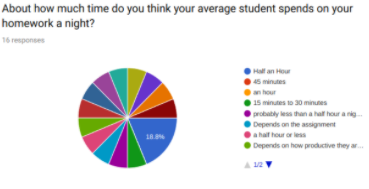
.According to Mr. Jones, who teaches iLearn, “Some classes are so content-heavy that there is no way you can pack everything a student needs to know into a few lessons, but I would like to encourage other teachers to think about what the purpose of the homework is, and is it moving students forward in their learning, or is it simply regurgitation of ideas of the work that they already learned.”
When questioned further about how other teachers might perceive his statements, he said:
“My suspicion is that it is difficult for them to envision a scenario in which they don’t assign homework because it is such a traditional component of education. And for a lot of people, students and teachers I think, and parents sometimes, think that the class surely must not be very rigorous if there is no homework involved. Sometimes, pressure from parents, even students, makes teachers afraid to try not assigning homework, because then it looks like they’ve lowered their expectations.”
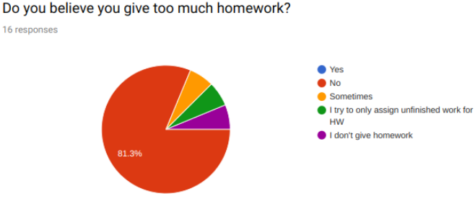
This is the culmination of why most of the world’s school systems give homework – they feel as if parents will not want to send their child to a school that does not give much homework – and many students think the same way.
To move the world’s school systems away from the ideas and ideals of homework, separating the stigmas of homework and workload equal to how much a student learns is essential.
According to Ms. Strasssler, who has just reached 20 years of teaching, “Many people believe that the more work you do, the more you learn, and that’s just not true.”
Mr. Jones agrees. He said, “I think the people are aware, to a certain extent that more work does not equal more learned, but they maintain that homework is part of the equation. And without homework, it is not really school. I think it has something to do with the rugged individualist mentality of Americans. This sort of idea, it’s a very European idea, it’s a very white idea. It’s basically that ‘we founded this country, we are pioneers, if we were able to do that, what it means to be great, what it means to be American – it’s working really hard, and having a lot of grit.’ And I think that trickles down to our ideals of homework, that students should be working a specific amount in school. In the classroom and beyond it. And it’s a hard mentality to break.”
Research may show that less homework seems like it is the best choice for students.
But what good can come of homework?
The benefits of having homework
Teachers all around the world give homework. But how much is it benefiting students?
According to Cornell University research, there is “Evidence of a positive correlation between homework and student achievement.”
According to an interview with John Hattie, an education researcher, he said that “The worst thing you can do with homework is give kids projects; the best thing you can do is reinforce something you have already taught.”
Many teachers at the iSchool agree with this as well. In an interview with Ms. Behar, who teaches chemistry, she said that she “Only gives review or study homework.”
This is really the core of how students learn – reviews.
The main blocks in a student’s learning are not remembering topics that were covered in class, then failing the test because of that.
Memorization shouldn’t be why students learn. That system especially does not make sense when students who have learning needs are not acknowledged.
According to Procon.org, homework can lead to higher test scores and a better chance for students to attend college. Procon.org also claims that “[students] need to apply information that teachers give them to truly learn it.”
To further prove this point, according to Edutopia, students typically retain about 66% of what they learn in class.” This shows that having a review of what the students have learned can be a very good way to make sure the students learn the information.
John Hattie also believes that homework has almost no effect on students in elementary and middle school – students should be focused on making friends and having a social life, as this is one of the best ways to relieve stress, according to HuffPost.
According to Newsweek, a study done at the University of Tubingen in Germany, homework can make students better people. The study also showed that “After-school assignments don’t just have academic effects-they are also linked to kids’ motivation to do the right thing and work hard.”
Homework may not be the most enjoyable thing for students, but it shows that it can seriously benefit their future if they complete homework.
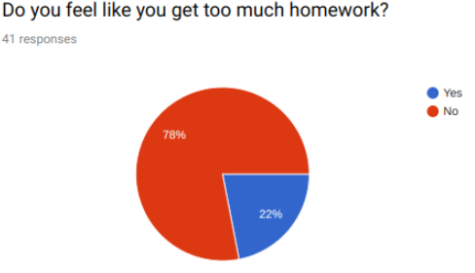
According to senior Annemarie Alms, “[iSchool] can be unsupportive homework wise. As long as you do your best, you should be fine.”
Annemarie receives about two hours of homework a night, and “I feel like I’ve learned a good amount from homework, and I can tell why they give it to me, although sometimes it’s a lot.”
But is it worth it?
The cons of homework
Not all people think that homework is beneficial. What does the research show?
According to Procon.org, a survey of high school students in California, 43% of the students polled said that homework was their greatest source of stress, and 59% said they receive too much homework. They also say “Whenever homework crowds out social experience, outdoor recreation, creative activities, and whenever it usurps time that should be devoted to sleep, it is not meeting the basic needs of children and adolescents.” Many students interviewed by Procon.org say that too much homework can lead to sleep deprivation, headaches, exhaustion, weight loss, and stomach problems.
Homework can also lead to problems with lower-income families.
A poll by the L.A. times shows that about 73% of students need the internet for homework. According to the Department of Education, 14% of children do not have access to the internet. Many students have reported that they have had late or missing assignments because they did not have access to the internet. This puts families with low income at risk for lower grades and lower GPA. According to Procon.org, students who took the National assessment of educational progress (math exam), students who did 30 minutes of homework got roughly the same score as those who did not do any of the homework. Students who did 45 minutes did worse.
Too much homework can take away from a student’s social life.
According to The Valedictorian’s guide, “The tight bonds created with friends serve as powerful forces that impact choices, behavior, and attitudes. They can also provide valuable support systems for the tumultuous teenage years. Sometimes these friendships may even last a lifetime.”
This shows that having a social life can be more important than pulling that all-nighter – not to mention the health effects that going all night has on a teenage body.
Sleep deprivation can lead to depression, according to a study done by the Sleep Foundation. In schools like New York City’s Stuyvesant High School, students have been known to commit suicide as a result of stress or work-related reasons.
So is homework at that level worth risking students’ safety?
A study by the University of Michigan found that reading, not for homework, but for pleasure is associated with higher achievement in tests for younger children.
This can show that having less homework is better. This can lead to more free time, and according to Ms. Gray, who teaches English, “I think it is really important for students to have a life outside of school.”
Is the iSchool’s mastery system: beneficial to student’s learning?
Known for its uniqueness, the iSchool uses a one-of-a-kind grading technique, the mastery system.
On paper, this system is supposed to encourage students to do well on tests, and demonstrate their educational prowess instead of their worth being boiled down to a single number on a piece of paper.
Mr. Jones said that “I think [the mastery system] in theory it’s exactly what we should be doing.”
But is this really true?
According to Ms. Alms, “The mastery system creates an environment that I don’t really focus on studying too much, because I can just take the test as many times as I want.”
Some students have not studied for a test, then simply took it a few times until they are satisfied with their grade.
This was not the intended usage of the mastery system, and there seems to be no consequence for students who do this.
But students that don’t take advantage of this system could seriously benefit from the mastery system.
Margareta Stern said that “I’m not a very good test taker, and the mastery system has helped me learn what I need to in order to pass with a high score.”
Some teachers operate the system differently. Ms. Guzman, who used to teach math (but left the school at the end of last year), only gave back the questions that the students missed, and according to Margareta, “It really helped me, because then I pushed myself to really understand the questions that I missed previously.”
According to an anonymous source, Mr. Jay “Makes you retake the entire test, and makes you keep that score, regardless of it was lower than the first one. That happened to me once, and that was really frustrating.”
Mr. Jones does not think there is an actual alternative to the mastery system, although he feels like sometimes it can be unhelpful in some classes that “Focus more on content as opposed so skill-building.”
So for students who simply want to avoid homework, the mastery system allows them to do that.
So what might it be like for students without homework?
Finnish students: a success story
Students in Finland might be considered lucky by some people – they don’t start school until they are seven, they don’t get homework, yet they have higher test scores and better college graduation rates.
So what happens behind the scenes?
In an article written by C.J. Westberg, a journalist for the Daily Riff, he explores his time spent in Finland touring schools all with one thing in common: the mentality that students should come to school and learn skills that will be useful in later life.
At one school that C.J. visited, he saw the students learning how to cook breakfast. In another classroom, he found students learning how to make bathing suits. In Finnish schools, students still learn the basics of what we learn here in the U.S., like math, reading, and writing.
However, the difference is that students don’t receive homework – they simply go home and spend time reading, outside, or being with friends.
When C.J. was interviewing an Education Chief (a principal), and he asked: “Do you think all these other activities in school takes time away from academics?” He responded with “Academics isn’t all kids need. Kids need so much more. School should be where we teach the meaning of life; where kids learn they are needed; where they can learn community skills. We like to think that school is also important for developing a good self-image, a strong sensitivity to other people’s feelings… and understanding it matters to take care of others.”
This is really the core of why students in the U.S. can become stagnant in their learning – they grow annoyed with having to wake up early in the morning just to memorize information and have their worth as a student boiled down to a simple test score and homework load.
To prove this point, Finnish schools rarely test their students.
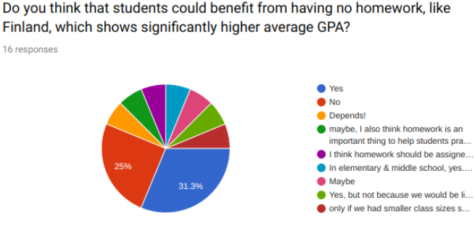
If they do, they are usually only assessments to judge where a student is in the content and the results do not affect the student’s grade. In the rare times when students in Finland take tests, their averages are much better than those in America.
Students who took the PISA test in Finland got a 531/600, while other countries (who give homework) got a 493/600.
This trend does not end at test scores.
Finnish student’s college attendance/graduation rate is 63% (the highest in the world) compared to the U.S.’s 52.8%. Not only that, but students in Finland (right out of college) can expect to earn 74,000 – 119,000$ a year according to Emolument.com, and Americans can expect to earn 50,000 – 90,000$ a year according to CNBC.
While this may be true, some may argue that Finland is a smaller, richer country than the United States.
While they are absolutely correct, it is possible for the Finnish system to work here. America would have to downsize class sizes, which means that the teachers can get to know the students individually and assess their learning first hand rather than through a test. Sure, that may be expensive, but if America can spare 2.4 billion dollars for a border wall, then we can certainly rework the education system, which already needs work.
Conclusion
Is homework really worth all the stress?
In short, there needs to be a balance between homework and no homework.
If a student receives too much homework, they can become overly stressed. With too little homework, students’ learning becomes stagnant and test scores drop.
The mastery system can help students who don’t take advantage of it – as long as you study, you should do fine on a test.
Hardworking students like Margareta shouldn’t have to work into the night to finish her report – she should not have her social life taken away simply because her teachers hand out unnecessary work. But her grades shouldn’t suffer either – there needs to be a balance.
